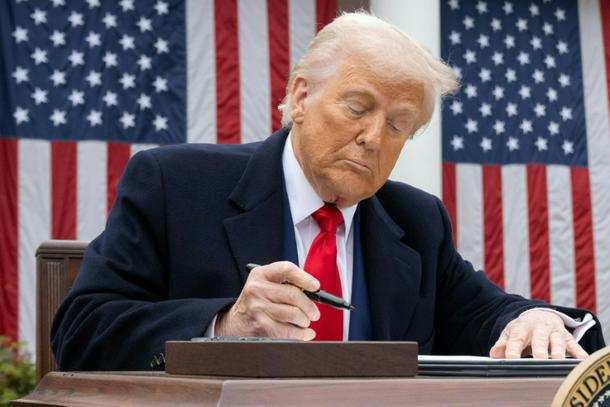
Markets have been hammered by Donald Trump's decision to impose sweeping tariffs on all trading partners
Hong Kong (AFP) - Equity markets tumbled Thursday after Donald Trump delivered a “haymaker” blow with sweeping tariffs against US partners and rivals, fanning a global trade war that many fear will spark recessions and ramp up inflation.
Tokyo’s Nikkei led Asia’s selloff, briefly collapsing more than four percent, while US futures plunged with oil prices, safe haven gold hit a record high and the yen jumped one percent amid worries retaliatory measures will deepen the crisis.
The panic came after the US president on his so-called “Liberation Day” unveiled a blitz of harsher-than-expected levies aimed at correcting trade deficits following what he says has been years of the United States being “ripped off”.
Against a White House backdrop of US flags, Trump announced that “for decades, our country has been looted, pillaged, raped and plundered by nations near and far, both friend and foe alike”.
Trump reserved some of the heaviest blows for what he called the “nations that treat us badly,” including 34 percent in new levies on rival China, 20 percent on key ally the European Union and 24 percent on Japan.
A number of other countries will face specifically tailored tariff levels, and for the rest, Trump said he would impose a “baseline” tariff of 10 percent. Auto tariffs of 25 percent kicked in on Thursday.
Investors are now steeling themselves for retaliatory measures, with governments making their anger clear.
China vowed “countermeasures” and urged Washington to cancel the tariffs, while calling for dialogue. Japan said the move was “extremely regrettable” and could contravene World Trade Organization rules, while Taiwan described the levies as “highly unreasonable”.
European Union chief Ursula von der Leyen called Trump’s announcement a “major blow to the world economy” but vowed the bloc was “prepared to respond”.
And France said Brussels was “ready for a trade war” and plans to target online services in response.
Thailand said it had a “strong plan” to handle the new US measures and hopes to negotiate a reduction, while Canadian Prime Minister Mark Carney warned “we are going to fight these tariffs with counter measures”.
“We are going to protect our workers,” Carney said.
- ‘Shock and awe’ -
Stephen Innes of SPI Asset Management said: “President Trump walked into the Rose Garden and detonated the most aggressive trade shock the market’s seen in decades. This isn’t a jab – it’s a full-on haymaker.”
Wall Street “had talked itself into a softer, more symbolic move. Instead, Trump carpet-bombed the global supply chain”.
“This was a ‘shock and awe’ tariffs campaign, dressed up in ‘reciprocity’ language but designed to throttle the trade deficit through brute force.”
He said the measures meant that inflation risks had surged and economic growth expectations would be cut, with the US Federal Reserve “pinned between a hawkish rock and a deflationary hard place”.
Tokyo pared its hefty drop slightly but still ended down 2.8 percent, while Hong Kong, Sydney, Seoul, Manila, Mumbai, Shanghai and Singapore also fell. However, Wellington managed to eke out a small gain as New Zealand faced smaller tariffs.
At the open in Europe, London tumbled more than one percent, while Frankfurt and Paris shed more than two percent.
Vietnam’s stock exchange dived more than seven percent after the country was hit with levies of almost 50 percent.
Wall Street futures were also battered, with the Dow dropping two percent, the Nasdaq plunging more than three percent and the S&P 500 off 2.8 percent off.
Safe havens rallied as traders sought to dump risk assets.
Gold hit a new peak of $3,167.84 and the Japanese yen strengthened to 147.04 per dollar from 150.50 the day before.
Among other currencies, bets that the Fed will have to cut interest rates to deal with the impact on the US economy weighed on the dollar, with the euro and pound both jumping more than one percent.
US Treasury yields sank to their lowest level in five months – yields and prices go in opposite directions.
Oil also suffered big losses, with both main contracts down more than two percent on fears that the shock to economies would hit demand.
Among the big losers on the corporate front, Japanese tech giant Sony shed 4.8 percent, while its South Korean rival Samsung was down 2 percent.
Car titan Toyota was off more than five percent, Nissan lost 3.7 percent and Honda was down 2.3 percent. Tokyo-listed tech investment firm SoftBank was off close to four percent.
And Hong Kong-listed e-commerce giants fell after Trump’s removal of a duty-free exemption for small parcels from China. Sector leaders Alibaba and JD.com shed around five percent.
Tai Hui of JP Morgan Asset Management said the scale of the measures raised concerns about growth.
“US consumers may cut back on spending due to pricier imports, and businesses might delay capital expenditures amid uncertainty about the tariffs’ full impact and potential retaliation from trade partners,” he wrote in a note.
- Key figures around 0715 GMT -
Tokyo - Nikkei 225: DOWN 2.8 percent at 34,735.93 (close)
Hong Kong - Hang Seng Index: DOWN 1.6 percent at 22,835.91
Shanghai - Composite: DOWN 0.2 percent at 3,342.01 (close)
London - FTSE 100: DOWN 1.5 percent at 8,484.07
Dollar/yen: DOWN at 147.04 yen from 149.39 yen
Euro/dollar: UP at $1.0975 from $1.0814 on Wednesday
Pound/dollar: UP at $1.3068 from $1.2985
Euro/pound: UP at 83.53 pence from 83.33 pence
West Texas Intermediate: DOWN 2.8 percent at $69.67 per barrel
Brent North Sea Crude: DOWN 2.7 percent at $72.94 per barrel
New York - Dow: UP 0.6 percent at 42,225.32 (close)